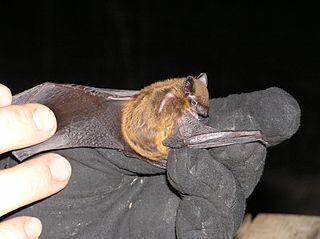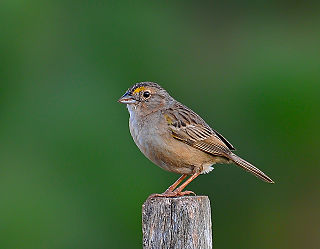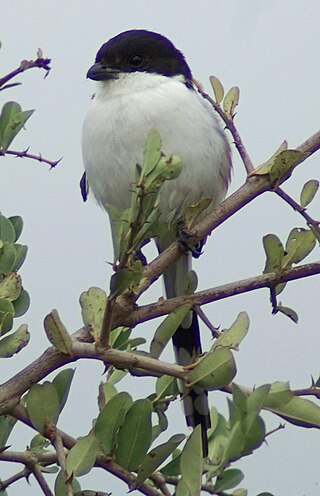
The bar-shouldered dove is a species of long tailed dove native to Australia and Southern New Guinea. It is protected under the National Parks and Wildlife Act 1974. It is a medium-sized pigeon varying in size from 26–30 cm (10–12 in). Its voice is a distinctive and melodious "cook-a-wook" or "coolicoo".

Nycticeius is a small genus of bats in the vesper bat family, Vespertilionidae, and the only member of the tribe Nycticeiini. It contains three species, the evening bat, the Cuban evening bat and Nycticeius aenobarbus. Some authorities include several other Old World species in Nycticeius, but recent genetic work shows that is a completely New World genus. Nycticeius is of Greek and Latin origin, meaning "belonging to the night".

The evening bat is a species of bat in the vesper bat family that is native to North America. Hunting at night, they eat beetles, moths, and other flying insects.

Allen's spotted bat is a species of vesper bat in the family Vespertilionidae found in the Central African Republic, the Democratic Republic of the Congo, Kenya, and Uganda. It is found in subtropical or tropical moist lowland forests.

The tawny-shouldered blackbird is a species of bird in the family Icteridae. It is found in Cuba and Hispaniola. It is a vagrant in the United States.

The grassland sparrow is a species of bird in the family Passerellidae. It is found in Argentina, Bolivia, Brazil, Colombia, French Guiana, Guyana, Paraguay, Peru, Suriname, Uruguay, and Venezuela. Its natural habitats are dry savannah, subtropical or tropical seasonally wet or flooded lowland grassland, and pastureland.

The northern fiscal is a member of the shrike family found through most of Sub-Saharan Africa. It used to be grouped with the southern fiscal. Together they were called the common fiscal. The fiscal gets its English and Afrikaans common names from its black and white 'suit-and-tie' appearance reminiscent of the taxman (‘fiscal’).
Dystasia is a genus of longhorn beetles of the subfamily Lamiinae, containing the following species:
Dystasia javanica is a species of beetle in the family Cerambycidae. It was described by Stephan von Breuning in 1938.
Dystasia proxima is a species of beetle in the family Cerambycidae. It was described by Stephan von Breuning in 1938. It is known from Borneo.
Dystasia siamensis is a species of beetle in the family Cerambycidae. It was described by Stephan von Breuning in 1938.
Dystasia subcristata is a species of beetle in the family Cerambycidae. It was described by Stephan von Breuning in 1938.
Dystasia bella is a species of beetle in the family Cerambycidae. It was described by Stephan von Breuning in 1940.
Dystasia chassoti is a species of beetle in the family Cerambycidae. It was described by Stephan von Breuning in 1973.
Dystasia laterivitta is a species of beetle in the family Cerambycidae. It was described by Stephan von Breuning in 1942.
Dystasia valida is a species of beetle in the family Cerambycidae. It was described by Stephan von Breuning in 1937. It is known from Borneo.
Dystasia semicana is a species of beetle in the family Cerambycidae. It was described by Francis Polkinghorne Pascoe in 1864.
Dystasia cristata is a species of beetle in the family Cerambycidae. It was described by Warren Samuel Fisher in 1933.
Dystasia sibuyana is a species of beetle in the family Cerambycidae. It was described by Per Olof Christopher Aurivillius in 1927. It is known from Malaysia, the Philippines and Borneo.
Dystasia tonkinea is a species of beetle in the family Cerambycidae. It was described by Maurice Pic in 1930.





